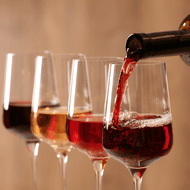UK's Post-Brexit: Redefining Wine with Relaxed Alcohol Rules
Posted by Emily on 18th Oct 2023 Reading Time:
The UK government is set to simplify wine rules after Brexit, especially for low-alcohol wines. Right now, a drink must have at least 8.5% alcohol to be called "wine" due to old EU laws. Drinks with less alcohol are labelled differently, like "wine-based drinks." This rule will change next year, making it easier for British winemakers.
 Mack Male from Edmonton, AB, Canada, CC BY-SA 2.0, via Wikimedia Commons
Mack Male from Edmonton, AB, Canada, CC BY-SA 2.0, via Wikimedia Commons
Interestingly, making wine involves fermenting grapes and sometimes removing alcohol for low-alcohol options. However, they still can't use the "wine" label if under 8.5% alcohol, unlike low-alcohol beers or ciders, which have more straightforward rules.
Soon, wines can have 0% alcohol and still be called wine. The government believes this change meets people's growing interest in low-alcohol drinks, offering more choices. This new rule will apply first in England, and thanks to post-Brexit rules, English wines can use the "wine" label across the UK.
This decision comes after research showed that calling non-alcoholic drinks "wine" isn't confusing for buyers. However, there's a small chance people might accidentally buy non-alcoholic wine, thinking it's regular. Despite this, "alcohol-free wine" is a common term in online shopping.
Last year, the EU made its low-alcohol wine rules less strict, but the UK didn't follow as it had left the EU by then.
Other new changes include:
- No more foil wrapping requirement on bubbly wine bottles.
- The industry group, the Wine and Spirit Trade Association, wants clear new labels to keep customers properly informed.
- Simon Stannard from the Association supports the changes but suggests clear descriptions of low-alcohol wine to avoid confusion.
- The sale of 'piquette,' a French low-alcohol drink, will be allowed, boosting vineyards' profits due to high interest in such products.
- There will be more flexibility on what kind of bottles can be used for wine, dropping the strict rules on specific bottle shapes.
- No more forced use of traditional corks wrapped in foil for sparkling wines, reducing waste and reflecting current trends.

